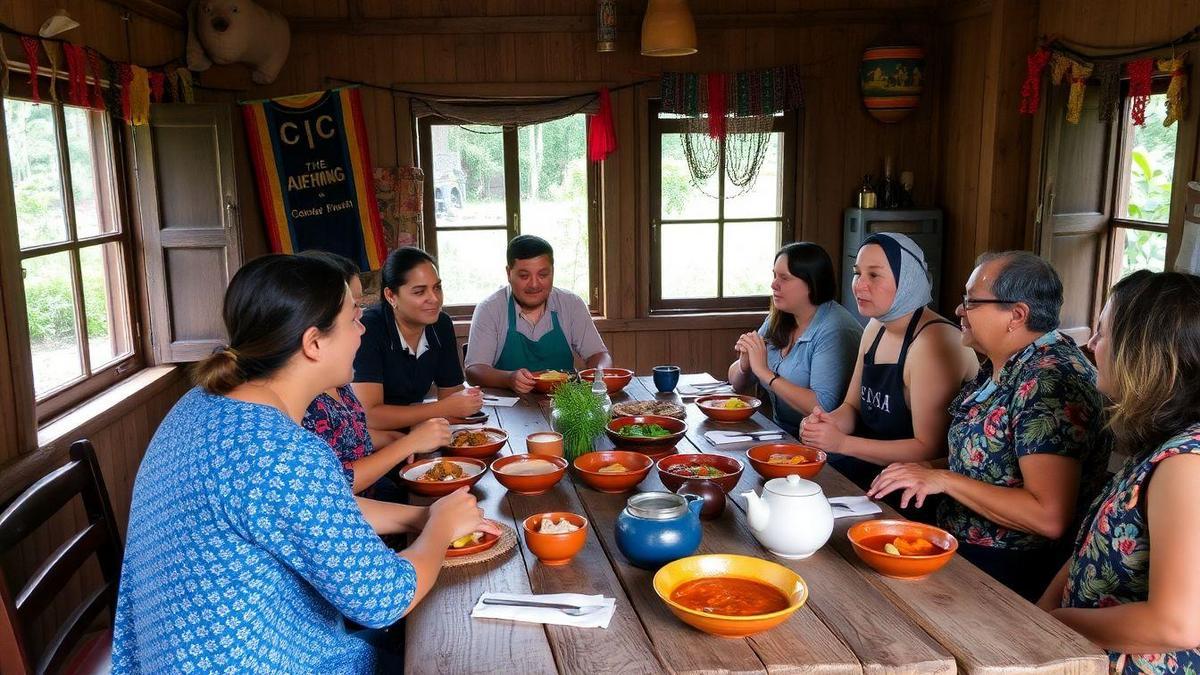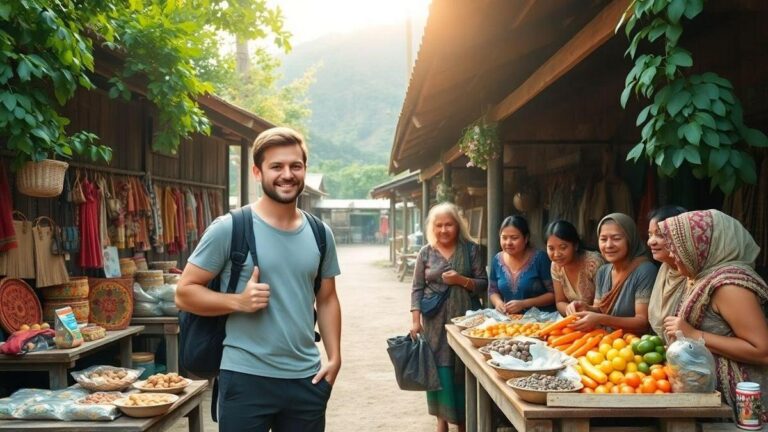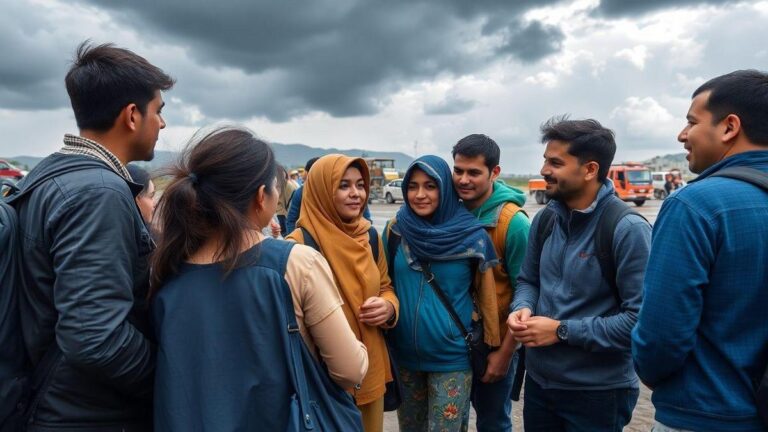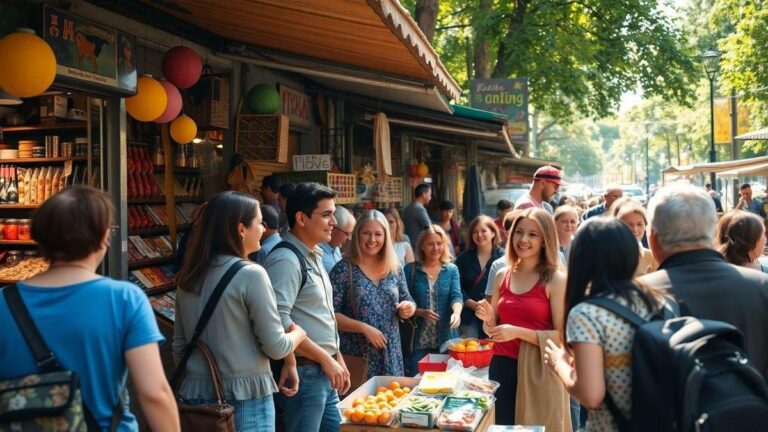Local dining experiences enhanced by language skills in remote regions
Local dining experiences enhanced by language skills in remote regions can turn a simple meal into an unforgettable adventure. Imagine connecting with locals, tasting fresh, authentic food, and sharing smiles through language. This article will take you on a journey through the magic of food and communication. Get ready to discover how your language skills can unlock delightful culinary treasures while immersing yourself in vibrant cultures!
Main Insights
- You can connect better with locals by speaking their language.
- Your language skills can make meals more enjoyable.
- You’ll find hidden gems when you ask locals for recommendations.
- You can learn about culture through food and conversation.
- Your dining experiences can become unforgettable adventures.
The Role of Language Skills in Local Dining Experiences
How Language Skills Enhance Your Culinary Tourism
When you travel to new places, language skills can be your best friend. Imagine walking into a local restaurant and chatting with the chef. You can learn about the special dishes, the ingredients, and the stories behind them. Knowing a few key phrases in the local language can make your dining experience feel extra special.
For instance, if you’re in Italy and can say “Buongiorno” or “Grazie,” it opens up a warm connection with the locals. You might even get tips on the best dishes to try or a secret recipe. This little effort can turn a simple meal into a memorable adventure.
Connecting with Locals Through Food and Language
Food is a universal language, but speaking the local tongue adds another layer to your dining experience. When you can ask about the menu items or share a laugh with the staff, it creates a bond. This connection can lead to discovering hidden gems that tourists often miss.
Here’s a quick list of how language skills can help you connect:
- Ask for Recommendations: Locals love to share their favorites.
- Learn About Ingredients: Knowing the words for local produce can spark interesting conversations.
- Enjoy Personalized Service: When staff see you making an effort, they often go the extra mile.
Discovering Rural Food Traditions with Ease
Venturing into remote areas can be a delightful experience, especially when it comes to food. Many rural communities have rich culinary traditions that are best understood through their language. By speaking with locals, you can uncover the stories behind their dishes and the history of their cooking methods.
| Language Skill | Benefit |
|---|---|
| Basic Phrases | Helps in ordering and understanding menus |
| Cultural Insights | Learn about food customs and traditions |
| Building Friendships | Form connections that enhance your experience |
Imagine visiting a small village and being invited to a family meal. Speaking the local language allows you to engage with the family, learn about their cooking techniques, and even participate in making a traditional dish. This is where language skills truly shine, making your journey more meaningful.
Exploring Local Cuisine Through Cultural Immersion
The Benefits of Farm-to-Table Dining
When you think about farm-to-table dining, what comes to mind? Freshness? Flavor? You’re right! This dining style connects you directly to local farmers and their produce. Eating at these places means you’re not only getting delicious meals but also supporting the local community.
Here are some benefits of farm-to-table dining:
- Fresh Ingredients: Meals are made with ingredients picked at their peak ripeness.
- Sustainability: This approach helps the environment by reducing transportation emissions.
- Community Support: You’re helping local farmers thrive.
Imagine biting into a juicy tomato that was picked just hours before your meal. That’s the magic of farm-to-table!
Engaging with Community-Based Dining Experiences
Community-based dining experiences are a fantastic way to dive deeper into local culture. It’s not just about the food; it’s about the connections you make. You might find yourself sharing a meal with a local family or joining a cooking class to learn traditional recipes.
These experiences often include:
- Cooking Classes: Learn how to make local dishes.
- Food Tours: Explore markets and taste local snacks.
- Cultural Festivals: Celebrate with the community through food.
Each bite tells a story, and you get to be a part of it!
Savoring Gastronomic Adventures in Remote Areas
Remote areas often hold hidden gems when it comes to food. You might stumble upon a small eatery that serves the best homemade pie or a local dish that’s been passed down through generations.
Here’s a table of some tasty dishes you might find in remote regions:
| Dish | Region | Description |
|---|---|---|
| Bannock | Canadian North | A simple, fried bread often served with jam. |
| Ceviche | Coastal Peru | Fresh fish cured in citrus juices, served cold. |
| Ramen | Rural Japan | Noodle soup made with local ingredients. |
These adventures can be a feast for your senses. You’ll enjoy flavors that are hard to find in big cities.
Finding Language-Friendly Restaurants for Unique Dining
Tips for Locating Local Dining Experiences
When you’re out and about, looking for language-friendly restaurants can feel like a treasure hunt. Here are some handy tips to help you find those hidden gems:
- Ask Locals: Don’t be shy! Chat with people around you. Locals often know the best spots where you can enjoy a meal and practice your language skills.
- Use Apps: Leverage technology! Apps like Yelp or TripAdvisor can filter restaurants by language options. Look for reviews that mention language-friendly service.
- Check Menus Online: Before you head out, peek at the restaurant’s menu online. If you see translations or pictures, it’s a good sign they cater to different language speakers.
- Join Local Groups: Connect with community groups or social media pages. They often share recommendations for places that welcome diverse languages.
Making the Most of Your Language Skills in Restaurants
Once you’ve found a restaurant, it’s time to put your language skills to good use! Here are some ways to make the most of your dining experience:
- Order in the Local Language: Even if it’s just a few words, ordering in the local language shows respect. It can lead to a warmer interaction with the staff.
- Engage with the Staff: Ask questions about the menu. Most staff will appreciate your effort and might even share stories about the dishes.
- Learn Key Phrases: Before you go, learn a few essential phrases. Words like “please,” “thank you,” and “delicious” can go a long way in making connections.
Enhancing Your Local Dining Experiences with Communication
Communication is the secret sauce to a delightful dining experience. Here’s how you can enhance your time at the table:
| Tip | Benefit |
|---|---|
| Smile and be friendly | Creates a positive atmosphere |
| Use gestures if needed | Helps bridge language gaps |
| Share your dining experience | Engages the staff and can lead to tips |
| Be patient | Good communication takes time |
By being open and friendly, you can create memorable moments. Remember, it’s all about enjoying the food and the people around you!
Frequently Asked Questions
How do language skills enhance local dining experiences in remote regions?
Language skills help you connect with locals. This makes the dining experience more personal and enjoyable. You can understand the menu better and share stories!
What are some challenges when dining in remote areas?
You might face language barriers. Menu items could be hard to understand. Sometimes locals may not speak English, making it tricky to order food.
Can learning a few local phrases really help?
Absolutely! Just a few phrases can open doors. You can impress the staff and get local recommendations. It shows respect for their culture too!
How can I find restaurants that offer local flavors?
Ask locals for their favorites! Use social media or apps to discover hidden gems. Language skills will help you ask for special dishes too.
What’s the best way to practice language skills before my trip?
Start small! Practice common phrases related to food. Watch local cooking shows or listen to podcasts. Join language groups to build your confidence!

Hey, I’m Paula — traveler, language nerd, and the curious mind behind znewz.com. I’ve always believed that real connections happen through words, gestures, and shared experiences — not algorithms. That’s why I created this blog: to share travel stories from around the world and explore how language helps us connect in ways that AI still can’t. Whether I’m getting lost in a tiny town or striking up a chat in a language I barely know, I’m here to show that sometimes the best moments happen when tech takes a back seat.






